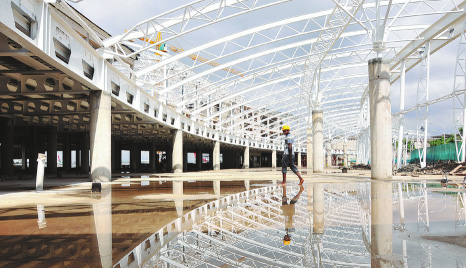Chinese firms take lead in building African airports
 0 Comment(s)
0 Comment(s) Print
Print E-mail China Daily, February 9, 2015
E-mail China Daily, February 9, 2015
|
|
|
The interior of Terminal 4 at Jomo Kenyatta International Airport in Nairobi. [Xinhua] |
When Chinese Premier Li Keqiang was in Africa in May of last year he enthusiastically spoke about how China and Africa could work together on highspeed railways, highways and aviation.
He also pledged more aid to the continent by raising Chinese concessional loans to it to $30 billion from $20 billion and said that infrastructure projects would take top priority.
"To realize inclusive economic growth, one needs to give priority to infrastructure development, in particular transport," Li told the World Economic Forum on Africa in Abuja, capital of Nigeria. "This is the basis on which the economy of developing countries takes off. In working with Africa, China will continue to give priority to developing infrastructure."
One of these priorities is the China-Africa Regional Aviation Cooperation Plan, through which joint aviation companies are being set up, jets to be flown on regional routes are being built, aviation technical personnel are being trained and supporting facilities are being built.
China has built roads and railways in Africa for many years, but its involvement in building airports has got into full swing only in recent years. Chinese companies have built airports in Kenya, Mali, Mauritius, Mozambique, Nigeria, the Republic of Congo, Togo and elsewhere. Many more are likely to be built within years with the backing of the government, particularly given that many countries are crying out for such infrastructure.
China's wealth of experience in building in its vast land, no matter the climate or the geology, is an advantage for Chinese companies' competitiveness, experts say. However, the lack of skilled people, who are familiar with international standards, competent in technical English and aware of the differences in construction contracting in Africa and China, is a big impediment to these ambitions being realized.
Africa accounts for only 2.85 percent of global passenger traffic and only 2 percent of global airport income, even though it is the second-largest continent and the second-most populous, according to the aviation industry consultancy Center for Asia Pacific Aviation. The Airport Council International Africa says it has 250 commercial airports as members, but that the continent needs more airports as flying becomes increasingly popular and as urbanization continues apace.
"With rapid growth across Africa, aviation is becoming more and more the preferred mode of travel," says spokeswoman Tebello Mokhema with the Airport Council International Africa. "Most of that development is taking place because of the rapid urbanization in most cities. Thus, with developing cities encroaching on airport land, airports are having to be relocated away from the expanding urban areas."
With continuing growth in air travel worldwide, the council says, there is growing demand for infrastructure that is safe and secure and fit for the demands of new generations of aircraft and the technologies they use.
The Center for Asia Pacific Aviation says $33.8 billion is invested or is earmarked to be invested in construction and associated projects at existing airports in 77 projects in more than nine African countries, meaning the average price tag on each of the projects is almost $440 million.
In many countries, airports built decades ago have long since become incapable of handling the thousands of passengers flowing through them every day. Jomo Kenyatta International Airport in Nairobi, capital of Kenya, opened in 1958 with capacity of 1.5 million passengers a year. But passenger flow has reached 6.5 million a year and it is estimated that this will reach 25 million in 2025.
Hong Shangyuan, general manager of China Airport Construction Group Corporation, says growth in Africa now echoes what China went through in its early days of reform and opening-up, when airport construction developed rapidly. "The airport construction industry in China grew at 1.5 to 2 times the speed of GDP growth at that time. And usually growth in aviation comes a lot earlier than does economic growth."
If political stability in Africa can be maintained, the market will continue to boom, he says. China Airport Construction Group Corporation, with an eye on the opportunities, opened an office in Togo in late 2012.
As Africa continues to grow economically it has become the ideal staging spot for Chinese companies eager to draw on their experience in building airports.
There are now more than 200 civil airports in use in China, and plans were announced for 100 new airports, and for 120 airports to be rebuilt or expanded during 2011-15.
"Many airports in China have been relocated and some have been expanded or rebuilt several times," Hong says. In the past 60 years there have been more than 10,000 airport projects in the country, Hong says.
Liu Ying, chief economist of the company, says: "In China we have built airports on land with all features that you can find anywhere else, and so Chinese companies have the technologies to tackle almost all challenges in building airports."







Go to Forum >>0 Comment(s)